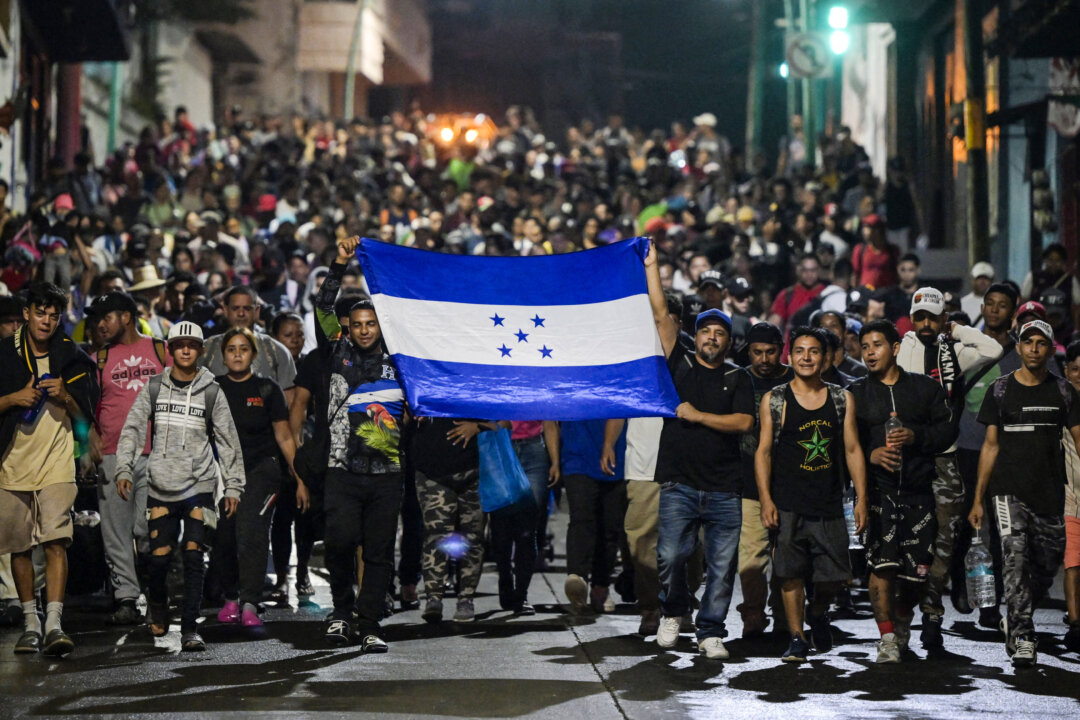The executive orders reverse Biden administration policies that critics said attracted some 11 million illegal immigrants into the United States.
President-elect Donald Trump will begin making good on his campaign promise with 10 executive orders signed after being sworn in today, including declaring a national emergency at the U.S. southern border that will pave the way for military deployment.
Trump’s executive orders will set the stage for a mass deportation operation and crack down on illegal immigration and crime.
Incoming White House officials said besides declaring a national emergency and directing troops to the border, Trump would reinstate the “Remain in Mexico” policy, end catch-and-release of illegal immigrants, build a border wall, designate criminal cartels as global terrorists, end refugee resettlement and birthright citizenship, and bring back the death penalty for certain crimes against federal agents.
Specifically, the national emergency declaration will allow the military and National Guard troops to build barriers and finish the wall along the U.S.–Mexico border.
It directs the secretary of defense to deploy additional personnel to the border, including members of the armed forces and the National Guard.
The executive order defines the military’s role in protecting the “territorial integrity of the United States.”
It includes sealing national borders by directing the military to repel “forms of invasion, including unlawful mass migration, narcotics trafficking, human smuggling, and other criminal activities.”
During his campaign for the presidency, Trump vowed to end the catch-and-release policy, which allows illegal immigrants to stay in the country after being processed.
Critics said the measure under President Joe Biden attracted some 11 million illegal immigrants into the country and created a border crisis.
“On Day One, I will terminate every open borders policy of the Biden administration,” Trump said during a campaign rally in January 2024.
To help curb illegal immigration, Trump will also bring back one of his most successful border measures during his first term as president—what’s commonly known as the “Remain in Mexico” policy.
Formally called the Migrant Protection Protocols, the policy requires asylum seekers to stay in Mexico while awaiting a hearing.
Trump campaigned on bringing the policy back, with many saying it eliminated one of the draws for illegal immigrants—the ability to live and work in the United States for months or years before an immigration judge heard their case.
On Jan. 16, the Senate Homeland Security and Governmental Affairs held a hearing examining the program, signaling its importance in Trump’s plans.
The committee passed a resolution along party lines asserting that Trump, as president, has the power to secure the border with laws already in place and use policies such as “Remain in Mexico.”
It’s unclear whether Trump has an agreement with Mexico to implement the policy, as he did during his first term.
By designating criminal organizations such as Tren de Aragua (Venezuela), MS13, and others as terrorist groups, the executive order will facilitate the removal of gang members.
Under the Alien Enemies Act, Venezuelan gangs, for example, will be considered an irregular armed force of Venezuela’s government “conducting a predatory incursion and invasion into the United States,” according to incoming officials.
Trump promised during his New York City rally at Madison Square Garden that he would end criminal enterprises run by violent, illegal immigrant gangs such as Tren de Aragua.Another executive order will restore the death penalty in public safety, directing the attorney general to seek capital punishment for the murder of law enforcement officers and capital crimes committed by illegal aliens.
The order also encourages state attorneys general to bring capital state charges for these crimes.
Officials said the order is in response to victims of illegal immigrant crime, such as Laken Riley.
In February 2024, the 22-year-old nursing student was murdered by an illegal immigrant while jogging at the University of Georgia in Athens, Georgia.
Congress passed the Laken Riley Act earlier this month with bipartisan support.
The legislation requires the Department of Homeland Security to detain illegal immigrants who have committed certain crimes, such as theft, burglary, or shoplifting.
Incoming officials said the order will address “some of the most violent, abusive criminals we’ve seen enter our country in our lifetime.”
The refugee resettlement executive order would “end asylum and close the border to illegals,” officials said.
Trump’s proclamation would create a process for immediate removal without the possibility of asylum.
Ending birthright citizenship would be a way to dissuade millions of illegal immigrants, though its legality is likely to be challenged.
Birthright citizenship is addressed under the 14th Amendment to the Constitution, which says “all persons born or naturalized in the United States, and subject to the jurisdiction thereof, are citizens of the United States and of the state wherein they reside.”
Trump’s executive order hinges on the “subject to the jurisdiction thereof” part of the amendment, meaning the federal government will not recognize automatic birthright citizenship for children of illegal aliens born in the United States.
The idea of birthright was decided in the 1898 Supreme Court case United States v. Wong Kim Ark. The High Court ruled that children born in the United States to immigrant parents are citizens, regardless of their parents’ immigration status.

